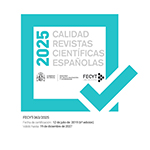Intersectional analysis of work-family balanced policies in the European Union and Spain
Abstract
Introduction. In this paper we analyze, from an intersectional perspective, the main European Directives of the last twenty years, in addition to the Spanish legislation related to the work-family and personal life balanced of work. Methodology. To this end, we have carried out a literature review followed by a codification of the source axes of inequality, such as gender, ethnicity, functional diversity, affective-sexual diversity, religion, socio-economic level, or socio-educational level. Results. Through a comparative review of the regulations, we seek the presence of an intersectional perspective. Conclusions and contribution. In most of the documents analyzed we detected the under-representation of the consideration of the multiple sources of inequality indicated. On the contrary, and almost exclusively, we identify measures to achieve equality between men and women. The multiple axes of inequality need to be jointly recognized to provide an adequate response to the diverse needs of reconciliation.
Downloads
Article download
License
In order to support the global exchange of knowledge, the journal Investigaciones Feministas is allowing unrestricted access to its content as from its publication in this electronic edition, and as such it is an open-access journal. The originals published in this journal are the property of the Complutense University of Madrid and any reproduction thereof in full or in part must cite the source. All content is distributed under a Creative Commons Attribution 4.0 use and distribution licence (CC BY 4.0). This circumstance must be expressly stated in these terms where necessary. You can view the summary and the complete legal text of the licence.











